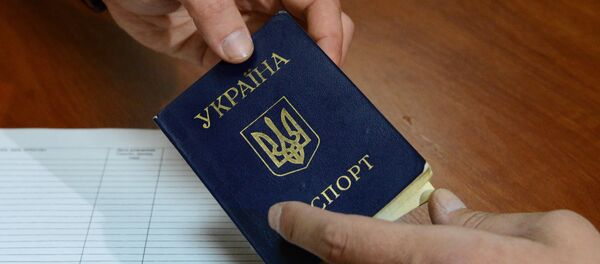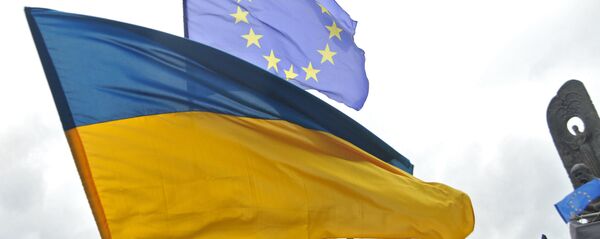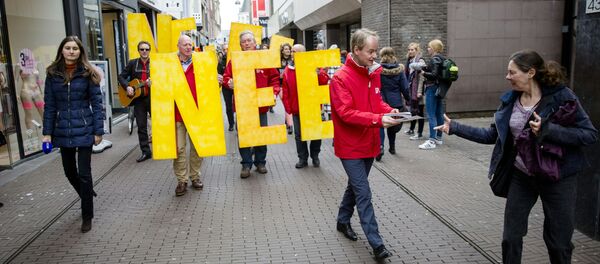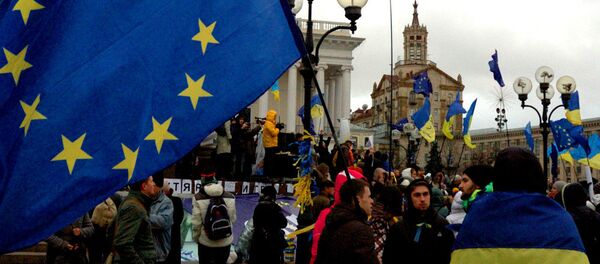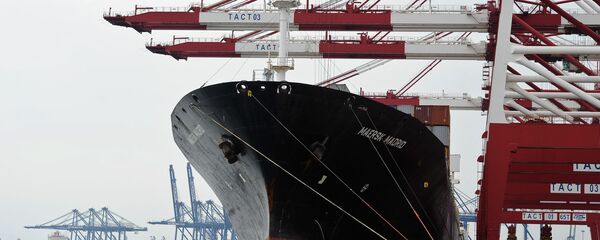Kiev and Brussels have not agreed a visa-free regime while a joint free-trade area has not been beneficial for Ukrainian people and businesses.
Experts suggest that Brussels delaying the decision on visas for Ukraine is not a sign of souring ties between Brussels and Kiev. Instead, it is related to the political situation within the European Union.
In the first months after President Viktor Yanukovych was ousted, the new government led by President Petro Poroshenko intensified ties between Kiev and Brussels, including signing the association deal, establishing a free-trade area and starting negotiations on removing visas for Ukrainian citizens. Kiev was drifting towards the EU amid cutting off ties with Russia.
After his inauguration in 2014, Poroshenko pledged that by 2020 Ukraine will implement the necessary reforms in compliance with EU norms and submit an application for EU membership. However, almost three years have passed since then, but no significant progress has been made.
EU Has Reasons to Delay Ukraine Visa Liberalization
Since 2014, Kiev strengthened efforts to comply with Brussels’ demands for visa liberalization. Finally, in December 2015, the European Commission officially confirmed that Kiev had implemented the required reforms and recommended considering a visa-free regime between Brussels and Kiev.
However, a year later, Brussels has not yet made the decision on the issue. Inaction by the European partners has placed Poroshenko in a difficult situation. The Ukrainian president has repeatedly extended supposed deadlines for visa liberalization. The current deadline is November 24, when the next scheduled Ukraine-EU summit will be held in Brussels.
"Ukraine has fulfilled all 144 requirements on visa liberalization and met all the criteria. I hope that Brussels will show solidarity with Kiev and recognize these achievements by granting a visa-free regime to Ukraine by November 24," Poroshenko said.
However, Brussels keeps away from setting any precise terms. Head of the Delegation of the European Union to Ukraine Hughes Mingarelli underscored that "this will happen in the coming future, not within 5-15 years."
Currently, there are no hidden reasons why Brussels is delaying visa liberalization for Ukraine, said Mikhail Pogrebinskiy, head of the Kiev-based Center for Political and Conflict Studies.
"I don’t think this situation stems from Brussels’ attitude towards Kiev. In fact, it has not changed over the past two years. Now, European officials have no illusions about the Maidan coup. But they know about corruption in Ukraine and other problems. But I think that the delay of visa liberalization is related to the inner problems of the bloc, including the migrant crisis," Pogrebinskiy told RIA Novosti.
At the same time, the expert expressed hope that finally the EU will introduce a visa-free regime for Ukrainian citizens, but it will be useless to most Ukrainians.
"The point is that this visa-free regime will be limited. For those who want to travel to Europe there is no problem getting a visa because those people usually have money. But tens of thousands of Ukrainians want to go to work in the EU. But Brussels never promised to make this possible," Pogrebinskiy explained.
Kiev’s Integration in Europe is Limited
Another hurdle in Ukraine’s path to the European family comes from the Netherlands. In November 2015, all 28 EU country members ratified the association agreement between Kiev and Brussels. However, in April 2016, the Netherlands held a referendum in which the majority voted against the deal with Ukraine. As a result, the Dutch government suspended the ratification of the agreement and began to look for a compromise scenario.
Kiev has serious concerns that the Netherlands will not confirm the ratification.
According to Ukrainian expert on international affairs Oleg Voloshin, the situation over the Ukrainian association deal in the Netherlands is related to the parliamentarian elections in the country next year.
"The current Dutch government led by Prime Minister Mark Rutte has to take into account the will of the people because next year Rutte will face the election and he doesn’t want to lose public support," Voloshin told RIA Novosti.
According to the analyst, the main problem for Ukraine is that its European integration is limited to only the association deal and a visa-free regime. Brussels is not considering full-fledged EU membership status for Kiev.
"The problem is that the entire Ukrainian national strategy is built around a worthless idea. Moldova’s case shows that a free-trade area and an association deal with the EU cannot change the situation in the country for the better," Voloshin said.
"Ukraine’s membership in the EU will never happen. This means that Ukraine will not became an EU country member thus it will never have access to European financial funds, like such countries as Romania, Bulgaria and Poland," he added.
Free-Trade Area and its Restrictions
The EU-Ukraine free-trade area was finally launched in 2016, and now the first statistics data reveal that not all the expectations came true.
According to the Ukrainian State Statistics Agency, in the first nine months of 2016, exports of Ukrainian products to the EU increased insignificantly against the same period last year, by 4.4 percent (to $9.7 billion). European imports to Ukraine increased by 7.3 percent, to $12 billion.
Compared to data from 2014, Ukrainian exports to Europe have seriously decreased. In the first nine months of 2014, Ukraine exported to Europe goods and services worth $13.4 billion.
What is more, Ukraine continues to lose positions in the Russian market. In the first nine months of 2016, Ukrainian exports to Russia dropped by 30 percent, to $2.5 billion, against the same period last year. Russia imports to Ukraine decreased by 34.3 percent, to $3.6 billion.
Ukrainian economic expert Alexander Okhrimenko underscored that quotas are trade benefits but trade should not be limited only to quotas.
"The size of European quotas is not a problem. Some of them are not even used by Ukrainian companies. The actual problem is that Ukrainian companies are not ready to produce goods meeting the EU’s high quality standards," the expert pointed out.
His assumption was echoed by executive director of the International Fund Blazer Oleg Ustenko.
"The European market has a great capacity of over $15 trillion. But in order to enter this market, Ukraine needs to invest in its manufacturers. Competitive products should meet two main demands. It should be high-quality and sell at a competitive price. As for quality, Ukrainian products are far from European standards," Ustenko told RIA Novosti.



